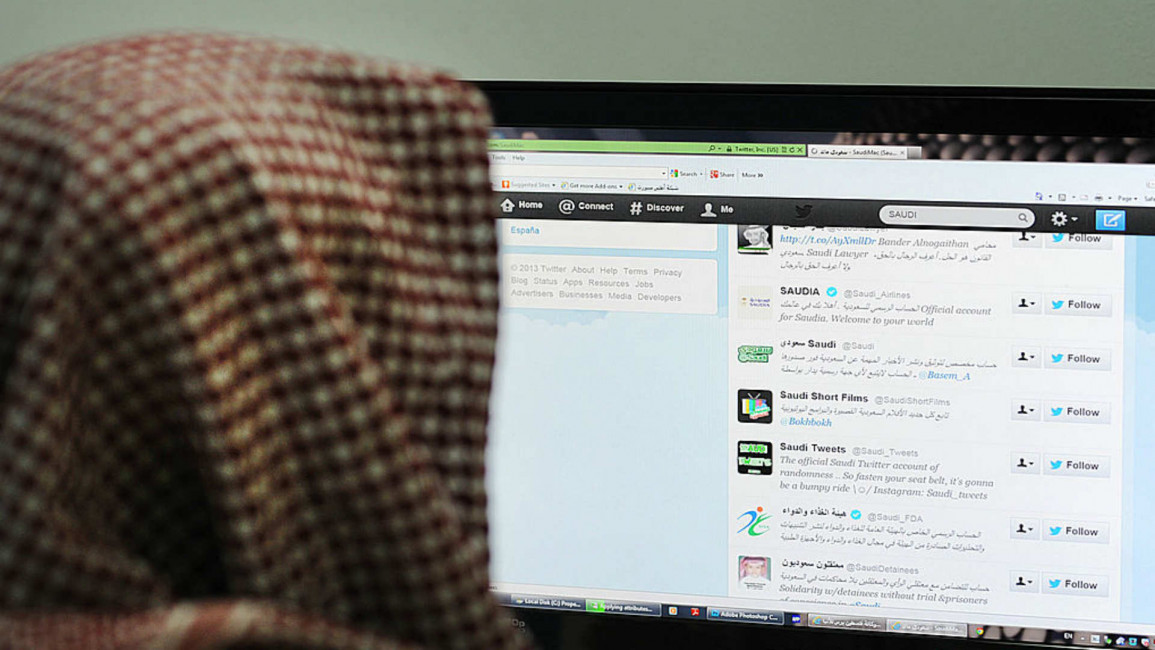
Next on Saudi Arabia's hit list is the Palestinian people
It started with a popular Saudi Ramadan series called "Exit 7" airing on the kingdom's MBC channel. The second episode included a controversial discussion that attempts to normalise business dealings with Israel, by portraying Palestinians as "the real enemy" who are hostile towards Saudi Arabia, and ungrateful for its support.
Simultaneously, Saudi twitter trolls and bots began circulating the hashtag #PalestineIsNotMyCause, accusing Palestinians of selling their lands to Israel and being raised to hate Saudi Arabia; tired claims that Israel routinely makes to discredit the Palestinian struggle for freedom and dignity.
This trending hashtag was widely and immediately praised by Israeli lobbyists as a sign of convergence between the Gulf and Israel, which indicates an organised and centralised campaign, rather than the organic opinions of individual twitter users.
Shortly after, Saudi Arabia's most read newspaper, Okaz, ran an article entitled "Palestinians: A Sea of Hatred that Doesn't Run Out!" written by a prominent Saudi regime loyalist, in which he repeats the mistaken cliche of Palestinians caving to Israel, and systematically slandering Riyadh out of hatred of the Saudi people and government.
Skyline, a Stockholm-based human rights organisation, issued a statement last Tuesday warning of the implications of Saudi hate speech against Palestinians. The statement documented dozens of cases of Palestinians who've suffered discriminatory and hate incidents in Saudi Arabia since the beginning of Ramadan.
 |
The growing anti-Palestinian rhetoric in Saudi Arabia suggests a grim picture in which only manufactured pro-normalisation rhetoric is allowed to rise |  |
The growing anti-Palestinian rhetoric in Saudi Arabia suggests a grim picture in which only manufactured pro-normalisation rhetoric is allowed to rise, while popular pro-Palestinian sentiment is systematically suppressed and disincentivised by the regime.
While Saudi regime loyalists such as journalist Malha Abdullah boast openly about receiving "encouragement, gifts and rewards" from the government for their writings, Saudi anti-normalisation activists enjoy no rewards, no tolerance or even minimal respect for their freedom of speech.
Twitter Post
|
Over the last two years, the Saudi regime has arrested and detained without charge dozens of activists who have dared to criticise Israel or normalisation, including women activists such as Nasima al-Sadah and Nuha al-Balwa. Last year, the Saudi government went further and arrested 60 Palestinians on charges of affiliation with Hamas.
Read more: Saudi Ramadan series blasted for attacking 'ungrateful' Palestinians and promoting 'normal relations' with Israel
These propaganda efforts are evidence of how, since Trump took office, the Saudi regime has been desperate to make its way to Washington through Tel-Aviv - as one Saudi diplomat once told me - by drawing a closer and more open alliance with Israel at the expense of the Palestinians.
This manifested most explicitly after the Saudi-orchestrated murder of journalist Jamal Khashoggi, when the Kingdom's de facto ruler Crown Prince Mohammed bin Salman turned to Israel's Netanyahu for help securing his throne.
Saudi efforts to disguise and frame criticism of Palestinians as genuine public opinion is a cheap stunt, designed to pave the way to normalisation, but not a new technique.
One source close to Khashoggi revealed in the Washington Post that the slain journalist died fighting what's known as the "electronic flies"; a horrifying troll army that the Saudi regime uses as a weapon to "manufacture public consent, push out propaganda, disrupt conversations and deliver threats."
By amplifying these pro-Israeli narratives, the Saudi regime is trying to draw Palestinian activists into a trap of self-fulfilling prophecy, in which Palestinian retaliation confirms the anti-Palestinian narrative the regime is trying to push.
And while King Salman might put out hollow statements of rhetorical solidarity with Palestinians, this desperate quest to make bedfellows with Israel shows a clear reality. Not only one of abandoned solidarity with Palestinians, but one of Saudi rulers seeking legitimacy through Israel and the US, rather than looking inwards towards their own people, and acting in their best interests.
Saudi Arabia is currently weathering multiple crises that are likely to have a significant impact on its citizens. From the economic slowdown as oil prices collapse, to the decline of the 2030 economic vision, to the inability to show any tangible results for the NEOM smart city project, and the muddled and failing war on Yemen.
 |
The kingdom is regrettably still putting time and resources into crafting an anti-Palestinian narrative through the media |  |
Yet despite all this, the kingdom is regrettably still putting time and resources into crafting an anti-Palestinian narrative through the media, twitter and other means, instead of investing into its people's welfare.
Although pro-normalisation Arab regimes often justify such inclinations by promising the fruits of Israeli-Arab collaboration would trickle down to the masses, such pledges have proven fictional at best.
Using Palestinians as a scapegoat to forge closer relations with Israel and the US is certainly not akin to acting in the Arab people's best interests, but instead that of their repressive and authoritarian rulers.
Providing a just solution to the Palestinian issue must be a prerequisite for any kind of regional integration. The more Arab regimes cave to Israel, the greater their peoples' fury will become.
Muhammad Shehada is a writer and civil society activist from the Gaza Strip and a student of Development Studies at Lund University, Sweden. He was the PR officer for the Gaza office of the Euro-Med Monitor for Human Rights.
Follow him on Twitter: @muhammadshehad2
Opinions expressed in this article remain those of the author and do not necessarily represent those of The New Arab.


![President Pezeshkian has denounced Israel's attacks on Lebanon [Getty]](/sites/default/files/styles/image_684x385/public/2173482924.jpeg?h=a5f2f23a&itok=q3evVtko)



 Follow the Middle East's top stories in English at The New Arab on Google News
Follow the Middle East's top stories in English at The New Arab on Google News


